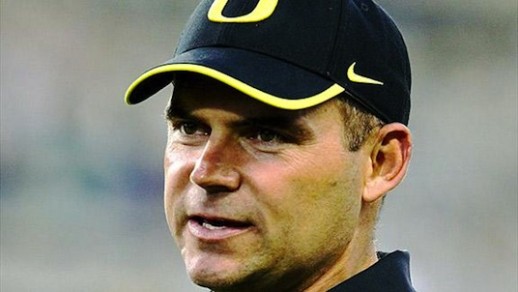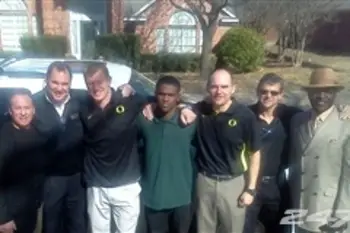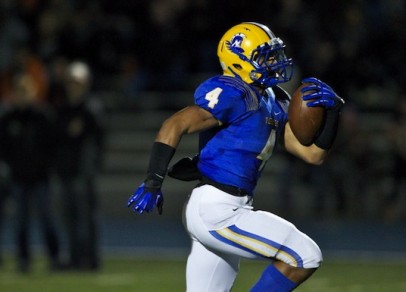This multi-week series will attempt to take a reasonable, logical and unbiased look at Oregon’s recent recruiting successes and failures while analyzing the program’s recruiting philosophy under Chip Kelly. The series will then look at how that philosophy already has and may continue to evolve under Mark Helfrich before ending with a detailed breakdown of the author’s ideal recruiting blueprint.
Part 1: What Happened in 2012-2013
Part 2: What Went Wrong
Part 3: What Went Right: The Oregon Brand
When Chip Kelly left for Philadelphia, a recruiting cycle that had been characterized by disappointment and confusion seemed like it was about to get even more chaotic. Thanks to Mark Helfrich, nothing could have been farther from the truth. Under Helrich’s guidance, the Oregon staff went on a recruiting tear that saved the 2013 class. The success of Oregon’s staff in the three weeks leading up to national signing day can be attributed to the philosophical changes that Helfrich implemented once Chip Kelly left.
The most important change Helfrich made when he took over as Oregon’s interim head coach was the decision to become more aggressive on the recruiting trail. Some attribute this to necessity, since recruits were worried about Chip’s departure and as of January 16th, and Oregon only had 13 commitments. Regardless of why Helfrich decided to be more aggressive, it worked. The Ducks were not only able to keep 12 of their 13 commits from heading elsewhere (the only exception being Dontre Wilson); they also added 7 more players by signing day. Given the circumstances, finishing with a top-22 class according to Rivals, Scout, and 247sports was seen as a major victory for the program.
While there are many examples of the more aggressive approach employed by the Oregon staff upon Chip Kelly’s departure, the most obvious and telling is what happened after Helfrich was officially announced as Oregon’s head coach. Immediately after finishing his introductory press conference, Helfrich and six assistants traveled around the country, filling the living rooms of current Duck commits. The group of coaches reassured commits that the Oregon football program was never about one man. Helfrich worked to convince recruits and parents of his competence and the presence of long-time assistant coaches vouching for him certainly didn’t hurt matters. Most importantly, it “comforted” those who had already committed to the program per Tyree Robinson.
The success of the “Magnificent 7” road-trip aside, the action itself signaled an obvious philosophical shift. Maybe sending 7 coaches into a recruit’s living room wouldn’t be seen as that big of a deal at Alabama, Notre Dame, USC or even Washington, but at Oregon, it represented a major change in recruiting practice. It’s hard to imagine Chip Kelly filling up a recruit’s living room with coaches, if only because he wouldn’t want to heap that kind of flattery on a high-school kid. For better or worse, it’s well documented that Chip didn’t like to “flatter”, and that meant avoiding actions that could be interpreted as such; like spending the time and money to put seven coaches in a player’s living room just to tell him how important he was to the program. There just isn’t a situation where Chip would have gone along with that. So, whether out of necessity or otherwise, the “Magnificent 7” showed Oregon fans early on that, at least in terms of recruiting, Mark Helfrich was not Chip Kelly.
Another change implemented under Helfirch was an immediate increase in the number of scholarship offers that were extended. Under Kelly, very few offers went out. The thinking is that Chip wanted to make sure his top choices at each position would have a spot if they decided to commit. The problem with this strategy is that it tended to alienate back-up options if the “top choices” turned the Ducks away. Note that in many cases “back-up options” were highly coveted blue-chip recruits. Chip’s strategy tended to be high-risk high-reward and definitely deviated from the norm (see: the strategies of all other major D1 teams). Despite the possible pros of this strategy, Helfrich decided to send out a wider range of offers almost immediately, resulting in commitments from guys like Devon Allen and Kani Benoit who had been waiting on Oregon to offer for months. Again, some will point to the idea that this was out of necessity (in order to fill the class), but just look at this year: even though it’s still very early in the process, Oregon has sent out significantly more offers at this point in the recruiting cycle than in any of the previous four years under Chip Kelly.
We’ll cover this more in next week’s article when we look at the future of recruiting under Helfrich and whether the philosophical differences we saw at the end of the 2013 cycle are here to stay
Ultimately, Mark Helfrich showed a willingness to “play the game” of recruiting, something Chip tried to avoid at all costs. Whether or not you personally agree with this change in philosophy, it’s worth noting that almost every powerhouse program “plays the game.” Schools like Alabama, LSU, Florida, Ohio State, and USC have reached the pinnacles of the sport thanks in large part to relentless and aggressive recruiting tactics. If you need more evidence that recruiting well has an overwhelmingly positive correlation to winning, look here and read the whole series to get a great statistical look at impact of recruiting and fully appreciate its importance.
It’s too early to know how big of gap there really is between the recruiting philosophies of Chip Kelly and Mark Helfrich, but three weeks is all that was needed to recognize that one exists. While Helfrich has made it known that he will not compromise on character, he’s already proven to have a more aggressive, and thus traditional, recruiting philosophy. If the last three weeks of the 2013 cycle is any indication, the future of Oregon football is bright.
Related Articles:
Chris was born in Montevideo, Uruguay, but made his way to Oregon by the age of five, when he attended his first game at Autzen Stadium. A huge sports fan at a young age, Chris grew up playing football, basketball and golf. Although realizing he isn’t likely to play in the NFL or NBA, Chris still holds on to hopes of being a professional golfer should his unfortunate putting woes take a turn for the better. A bit of a platypus, he attended both Oregon State and Oregon during his collegiate days where he earned a business degree in Finance and Business Administration. Chris works for Daimler Trucks North America in Portland, and plans to get his MBA from the University of Oregon.
Chris has been an active member in the recruiting community since 2005. He studies the intricacies of recruiting and is particularly intrigued by talent evaluation techniques. He is currently working on developing his own scouting reports for every scholarship player on the UO roster. Chris lives with his wife, Katrina, and his two-year-old son Lucas (a future dual-threat QB).



